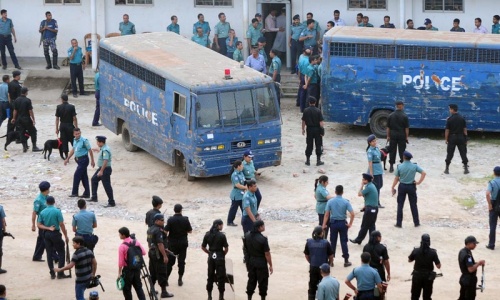CHITTAGONG: A Bangladesh court sentenced Thursday the leader of the country's largest religious party and 13 others to death over a huge 2004 arms smuggling racket, sparking fears of new political unrest.
Motiur Rahman Nizami, 70, leader of the Jamaat-e-Islami party, was convicted and sentenced over the racket involving 10 truckloads of arms seized by police a decade ago at a Bangladesh port.
“We're satisfied with the verdict. This is an unprecedented case and all those accused have got due justice,” prosecutor Kamaluddin Ahmed told AFP from the southern port city of Chittagong.
Prosecutors said Nizami, who was industries minister at the time, helped unload the weapons at the port that included 4,930 firearms and 27,020 grenades destined for a rebel group across the border in northeast India.
Nizami, who has led Jamaat for more than a decade, was among 50 people charged with smuggling, arms possession and other offences over the cache thought to be the largest haul in Bangladesh history.
Among the 14 sentenced to death on Thursday over their roles was ex-home minister Lutfuzzaman Babar, former chiefs of the country's two main intelligence agencies and other officials in the then government.
One of India's most wanted men, Paresh Baruah, leader of the United Liberation Front of Assam (ULFA), was also handed the death penalty in absentia over the weapons which were meant to help his group's decades-long separatist struggle.
Baruah has long been on the run.
The crowded court witnessed emotional scenes after the verdict was handed down, with a government bureaucrat fainting, and Babar crying out “No justice!”.
“The verdict is given to make someone happy. I'll get justice in the after world,” Babar yelled to the court.
Tight security
Security was tight in Chittagong where the judge delivered his long-awaited decision, following a trial that lasted for years.
Extra police and elite Rapid Action Battalion (RAB) officers were deployed in key areas as a precaution, amid concerns Jamaat party activists could take to the streets to protest the decision.
Deadly unrest that erupted in the weeks leading up to this month's controversial general elections, including strikes, transport blockades and other protests, were mostly blamed on Jamaat activists.
Police said Jamaat supporters staged a violent protest in the northwestern city of Rajshahi after the verdict, while about 200 pro-opposition lawyers also protested outside the Chittagong court.
“They exploded a small bomb and we fired rubber bullets to disperse them.
No one was injured,” deputy commissioner of Rajshahi police Tanvir Chowdhury told AFP of the protest there.
Prime Minister Sheikh Hasina has vowed to bring stability after the crippling opposition protests that have left around 180 dead since October.
Jamaat activists also led deadly protests last year against war crimes trials underway against some of its leaders over alleged atrocities committed during the 1971 war of independence against Pakistan.
Nizami, who is also one of a dozen Jamaat leaders facing trial for war crimes, has been in custody over that case and the arms smuggling one since 2010.
Defence lawyer Kamrul Islam Sazzad told AFP they would appeal, rejecting the verdict as “politically motivated” and aimed at “pleasing India”.
The verdict was expected to boost ties between Bangladesh and India, which earlier this month backed Hasina's controversial election victory, and has long wanted the case resolved.
Nizami was an influential minister in the former government led by the Bangladesh Nationalist Party (BNP) which was allied with Jamaat.
The parties were thrown out of power after suffering a huge defeat in Dec 2008 elections.
The secular Awami League-led government led by Hasina, which regained power at the Jan 5 elections amid an opposition boycott, has pursued the arrests of the major figures in the case since coming to government.
The verdict was expected to boost ties between Bangladesh and India, which earlier this month backed Hasina's controversial election victory, and has long wanted the case resolved.
Prosecutor Ahmed said Thursday's judgement proved a “collusion” within senior ranks of the former BNP-led government, intelligence agencies and the ULFA.
Police discovered the weapons as they were being unloaded at a jetty of a state-owned fertiliser factory that Nizami's ministry controlled.
The weapons, most of which were made in a Beijing factory, also included 300 rockets, 2,000 grenade launching tubes, 6,392 ammunition magazines and 1.14 million bullets, according to Ahmed.


































